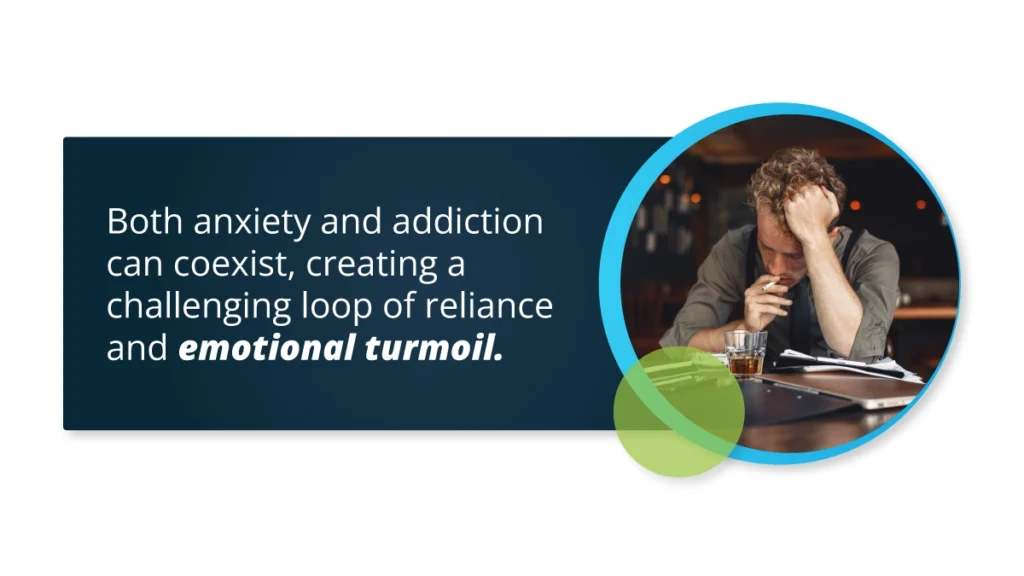Many people find themselves on a challenging journey when navigating the complex relationship between addiction and anxiety, often without realizing it. Anxiety is a common part of daily life and can drive individuals towards misusing alcohol and prescription drugs. People sometimes use these substances to relieve social anxiety or panic disorders temporarily.

Conversely, addiction can cause anxiety, especially during withdrawal, leading to heightened unease. Traumatic events can worsen this cycle of dependency and mental health issues. Addressing addiction and anxiety is vital, as they often reinforce each other, creating a challenging loop of reliance and emotional turmoil.
Key Takeaways
Understanding the connection between anxiety and addiction is important for providing effective treatment and support. Here is what you need to know:
- Both anxiety and addiction can coexist, creating a challenging loop of reliance and emotional turmoil.
- Common addictions encompass a range of behaviors and substances, impacting physical, mental, and social well-being.
- Recognizing the signs of addiction and anxiety is important for seeking professional help and intervention.
- Specific anxiety disorders can lead to addictions, highlighting the importance of dual diagnosis treatment.
- Dual diagnosis treatment, medication-assisted, CBT, and DBT approaches offer diverse options for addressing addiction and mental health.
The Haven Detox-Little Rock is here to provide extensive support. Contact us at (501) 271-3342 today.
Understanding Addiction
Addiction, a multifaceted issue, can be a complex interplay between the brain, social situations, and individual experience. It often involves the compulsive use of a substance, such as drugs or alcohol, despite adverse outcomes. Understanding addiction is essential to providing effective treatment and support for those affected.
Impact of Addiction on Brain’s Chemistry
Substance and behavioral addictions can significantly impact the brain’s delicate chemistry. It can alter the brain’s reward system, leading to the continuous pursuit of illicit substances despite the harmful effects.
Behavioral addictions, such as gambling or compulsive gaming, can have similar effects on brain chemistry, further reinforcing addictive behaviors.
In the case of alcohol dependence or drug addiction, the brain’s physical symptoms during withdrawal can be severe. It can lead to mental issues, causing a relapse.
Common Addictions
Common addictions encompass a range of behaviors and substances that individuals may become dependent on. Some of the most prevalent addictions include:
- Substance addiction
- Internet addiction
- Gaming addiction
These addictions can significantly impact a person’s life, leading to adverse physical, mental, and social consequences.
Signs and Symptoms of Addiction
Recognizing the signs of addiction is crucial. It often involves changes in behavior, deteriorating physical health, and social isolation. However, addiction can be accompanied by co-occurring disorders, complicating the diagnostic process. Some of the signs and symptoms of addiction include:
- Compulsive, uncontrollable substance use
- Increasing tolerance, requiring more of the substance to achieve the desired effect
- Experiencing withdrawal symptoms when attempting to quit
- Neglecting responsibilities and obligations in favor of substance use
- Spending a significant amount of time obtaining, using, or recovering from substance use
- Social withdrawal and isolation
Identifying these signs can help individuals seek professional help. It’s important to note that addiction is an individual experience, and its impact varies among different people.
Explaining Anxiety
Anxiety is a common mental illness that affects people of all ages. It can manifest in various ways, often causing distress and impairing one’s ability to lead a fulfilling life. Understanding anxiety is essential for seeking help and support, as it affects not only the individual but also their family members and social circle.
Neurology Behind Anxiety
Anxiety originates in the brain, with specific brain regions playing a key role in its development. When these regions become overactive, it can lead to anxiety symptoms. The brain’s intricate circuitry is responsible for processing fear, stress, and worry, and anxiety disorder causes the elevation of these emotions.
Common Anxiety Disorders
Anxiety disorders are a group of mental health conditions characterized by excessive and persistent feelings of anxiety, fear, or worry. They can significantly interfere with a person’s daily life and functioning. Common anxiety disorders include:
- Generalized anxiety disorder (GAD)
- Social anxiety disorder (social phobia)
- Obsessive-compulsive disorder (OCD)
- Post-traumatic stress disorder (PTSD)
These disorders impact millions, often leading to significant distress and disruption in daily life.
Signs and Symptoms of Anxiety
Signs and symptoms of anxiety can manifest in various ways. Anxiety can have physical and behavioral aspects. Anxiety can present with multiple symptoms, such as:
- Excessive worry or fear
- Restlessness and irritability
- Muscle tension
- Sleep disturbances
- Rapid heart rate
- Shortness of breath
Recognizing these signs is essential in seeking help and managing the impact of anxiety on daily life.
The Complex Relationship Between Anxiety and Addiction
The connection between anxiety and addiction is intricate, often representing a two-way street where anxiety can serve as a precursor to addiction, and addiction can induce stress. This complex interplay significantly impacts individuals dealing with substance abuse and mental health disorders.
Anxiety as a Precursor to Addiction
For many, anxiety symptoms can be the catalyst that leads to substance abuse. Anxiety often prompts individuals to seek solace or relief through self-medication, commonly involving alcohol or drugs.
In the face of relentless worry or panic attacks, substances like alcohol or stimulants can offer temporary respite. This self-medication can be a slippery slope, culminating in alcohol addiction or drug abuse. Anxiety can act as a driving force in these cases, pushing individuals towards using substances as a coping mechanism.
Addiction-Induced Anxiety
Conversely, addiction can sow the seeds of anxiety. During withdrawal or in the throes of addiction, individuals may experience intensified anxiety symptoms. This anxiety, brought on by substance use disorder (SUD), creates a tumultuous cycle.
Moreover, substances, especially stimulants and certain prescription medications, can aggravate anxiety disorders. That makes it a challenging cycle, as those suffering from addiction-induced anxiety will likely continue using substances to alleviate their heightened distress.
The Co-Occurrence of Anxiety and Addiction
Understanding the nexus between specific anxiety disorders and associated addictions sheds light on how underlying causes and unique triggers contribute to developing substance abuse issues.
Generalized Anxiety Disorder and Alcoholism
Generalized anxiety disorder (GAD) is marked by excessive, uncontrollable worry about various aspects of life. This endless unease can drive some individuals towards alcoholism as a means of self-medication.
Alcohol temporarily relieves the relentless anxiety and its physical manifestations, including chest pains and muscle tension. However, this coping mechanism can lead to long-term alcohol dependence, compounding their substance abuse issue.
Panic Disorder and Opioid Addiction
Panic disorder, characterized by sudden and intense panic attacks, may lead individuals toward opioid addiction. The acute distress experienced during these episodes often drives people to seek immediate relief, which opioids can provide.
Unfortunately, opioid addiction can result in a myriad of problems, including long-term physical and mental health issues. This linkage between panic disorder and opioid addiction underscores the need for early intervention and emotional support to address underlying causes.
Obsessive-Compulsive Disorder and Addiction
Obsessive-compulsive disorder (OCD) is defined by irrational fears (obsessions) and repetitive behaviors (compulsions). People with OCD may turn to different types of addictions to soothe their distressing thoughts.
This self-medication can sometimes manifest as various substance abuse issues, including alcohol abuse or illicit drug use. For those struggling with OCD, understanding the connection between their disorder and addiction is necessary for seeking appropriate treatment and support.
Holistic Treatment Approaches for Recovery
Holistic treatment approaches encompass many therapeutic methods that focus on treating the individual as a whole mind, body, and spirit. These approaches consider physical, emotional, and spiritual well-being.
They often include nutrition, exercise, mindfulness, meditation, and alternative therapies like acupuncture or yoga. Holistic treatment addresses the symptoms and underlying causes of addiction and mental health disorders, promoting long-term recovery and overall well-being.
Dual Diagnosis Treatment
Dual diagnosis treatment is designed for individuals with substance use disorders and co-occurring mental health conditions. It recognizes the complex interplay between addiction and mental illness and provides integrated care to address both simultaneously. This approach involves a combination of therapy, medication, and support to manage addiction and mental health symptoms effectively.
Medication-Assisted Treatment (MAT)
Medication-assisted treatment (MAT) combines medication with counseling and therapy to address substance use disorders, particularly in cases of opioid and alcohol addiction. Medications like methadone, buprenorphine, or naltrexone can help reduce cravings and withdrawal symptoms, making it easier for individuals to focus on their recovery. MAT is a vital component of comprehensive addiction treatment.
Cognitive-behavioral therapy (CBT)
Cognitive-behavioral therapy (CBT) is a widely used therapeutic approach that helps individuals identify and change negative thought patterns and behaviors. It is effective for treating various mental health conditions, including addiction. CBT equips individuals with coping strategies and skills to manage triggers and cravings, facilitating lasting recovery.
Dialectical Behavior Therapy (DBT)
Dialectical behavior therapy (DBT) is a specialized form of cognitive-behavioral therapy emphasizing emotional regulation and interpersonal effectiveness. It is particularly beneficial for individuals with complex emotional issues and those at risk of self-harm or suicide. DBT teaches skills to cope with intense emotions and improve relationships, making it valuable for those with co-occurring disorders.
Frequently Asked Questions (FAQ)
Is there a correlation between anxiety and addiction?
Yes, there is a significant correlation between anxiety and addiction. Anxiety can contribute to the development of addiction, as individuals often turn to substances like alcohol or drugs as a means of self-medication to alleviate their anxiety symptoms.
Conversely, addiction can induce anxiety, especially during withdrawal, creating a challenging cycle. This complex interplay underscores the importance of addressing both issues comprehensively through dual diagnosis treatment to achieve lasting recovery.
What medication is used for anxiety and addiction?
Medication for anxiety typically includes selective serotonin reuptake inhibitors (SSRIs), serotonin-norepinephrine reuptake inhibitors (SNRIs), benzodiazepines, and other anxiolytics. Medication-assisted treatment (MAT) involving drugs like methadone, buprenorphine, or naltrexone is commonly used for addiction, particularly in cases of opioid and alcohol use disorders. The choice of medication depends on the specific condition and should be determined by a medical professional as part of a comprehensive treatment plan.
Are anxiety attacks more of a habit or an addiction?
Anxiety attacks are neither a habit nor an addiction. They are acute episodes of intense fear and distress. Habits are typically repetitive behaviors, while addiction involves compulsive substance use. Anxiety attacks manifest as an anxiety disorder, often triggered by stress or underlying mental health conditions.
They are not a habit, but their impact on an individual’s life can lead to harmful practices or, in some cases, substance use as a coping mechanism for managing anxiety, which may lead to addiction. It’s essential to differentiate between these concepts for accurate diagnosis and effective treatment.
Find Stability in Life With The Haven Detox-Little Rock
For those who may be battling with anxiety and addiction, The Haven Detox-Little Rock offers assistance. Our detox services are designed to provide a secure and nurturing atmosphere where you or your loved one can receive help in managing withdrawal symptoms.
In our residential program, you’ll find a structured and caring setting where you can focus on your recovery journey with the guidance of our experienced professionals. Moreover, our mental health services are tailored to address anxiety and addiction’s emotional and psychological aspects.
Contact us at (501) 271-3342 today, and let us guide you to a healthier life.



